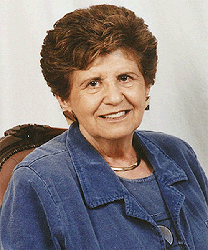|
Rena Ferber Finder Rena was born in Krakow Poland in 1929 and grew up in a middle class neighborhood. Although antisemitism pervaded Kracow, Rena had a comfortable childhood surrounded by loving family and friends. Rena’s entire life changed with the German invasion of Poland in September 1939. Jews were forced to move into the ghetto, which was isolated from the rest of Kracow. Rather bitterly, Rena recalls how non-Jews who were able to see all that was happening to Jews did nothing to help their Jewish neighbors. In the ghetto, the Gestapo took Rena’s father away and he never returned to his family. In time, the SS made plans for the evacuation of the ghetto, ordering all the residents to move up the hill to the Plaszow work camp, located on the site of an old Jewish cemetery, and run by the sadistic commandant, Amon Goeth. From Rena’s perspective, the most hopeful ray of light was Emalia, an enamel kitchenware and ammunition factory owned by the German Christian industrialist Oskar Schindler. Unlike other industrialists such as the managers of Krupp and I.G. Farben, who took advantage of slave labor in the SS camps and mistreated their workers, Schindler did everything in his power to provide his Jews with sufficient food and accommodations. Rena and her mother had an influential relative on the Jewish Council, who had them enumerated on Schindler’s list. Thus for six months they had the good fortune of being Schindlerfrauen, women working at Emalia under far more humane conditions than those in other workshops at Plaszow. In 1944 Schindler was forced to dismantle Emalia. The women were initially sent to Auschwitz-Birkenau. Rena was 15 years old. Schindler was able to relocate his factory to Brunnlitz, Czechoslovakia and negotiated with the SS to send his former workers to the Brunnlitz plant. After the Russians liberated Brunnlitz in May 1945, Rena and her mother joined the thousands of other survivors in displaced persons camps located in Germany and Austria. For three long years, they waited for a visa to come to the United States to be with a family friend who had settled in Peabody, Massachusetts before the war. In the fall of 1948 Rena moved to the United States with her husband Mark, whom she had married in 1946. There she was reunited with her friends, Sonia Weitz and Norbert and Blanca Borell, who had arrived six months earlier. |
